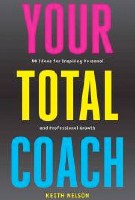The Coaching Manual
The Definitive Guide to the Process, Principles and Skills of Personal Coaching
By Julie Starr
ISBN 978-0273713524
 Are you a good listener? A perceptive observer? Or perhaps you know instinctively when something isn’t ‘right’? We are all born with some coaching ability and the key to becoming a great coach is knowing what your strengths are and building on these.
Are you a good listener? A perceptive observer? Or perhaps you know instinctively when something isn’t ‘right’? We are all born with some coaching ability and the key to becoming a great coach is knowing what your strengths are and building on these.
The Coaching Manual will help you do precisely this. Starting from where you are now, you’ll find all the powerful tools, techniques and guidance you need to take you to where you want to be.
A definitive reference manual throughout your coaching career this edition includes how to plan a coaching assignment, recognising and avoiding barriers to a good coaching conversation, and what happens if you adopt a less directive style.
Recommended for:
Your Total Coach
By Keith Nelson
ISBN 978-1-906821-59-3
 Your Total Coach provides 50 inspiring ideas that will support and enhance your coaching skills and is focused on raising performance. It is a book of the time, reflecting the challenges we face in our personal and professional lives.
Your Total Coach provides 50 inspiring ideas that will support and enhance your coaching skills and is focused on raising performance. It is a book of the time, reflecting the challenges we face in our personal and professional lives.
Set out in three tiers, each representing a different stage of coach development, it is essential reading for aspiring coaches, professional coaches and ambitious leaders who want to realise their own potential and that of the teams they work with.
Keith Nelson, founder and managing director of Your Total Coach, is a highly experienced coach who is passionate that coaching is the tool for raising performance for clients and their businesses in a way that also enriches their lives.
To download the introduction FREE click here
Recommended for: All coaching courses run by YTC; general interest
Time and management
Personal development has to take a back seat for many middle managers due to lack of time.
Recent research by the Ashridge Business School showed that even though three-quarters of the professionals questioned worked for organisations which claimed to support such development, only 53% were given time to follow it through.
Even though the majority (77%) did have personal development plans in place 80% of those questioned felt that it was very much down to them to make it happen, with only a quarter of middle managers having a mentor, career or life coach.
The School’s Programme Director, Hamish Scott, described it as ‘short-sighted’. He said: “We need to get the middle moving, inspired and fulfilled; this means investing in people development to equip them with the skills to do their job and keep UK business running smoothly…and not use middle management as a stepping stone position.”
Trends in developing talent
On-the-job training is cited as one of the most effective methods of developing staff, alongside in-house development programmes and coaching by line managers – perhaps reflecting the need to watch the bottom line more closely in the current economic climate.
However, when it comes to talent management coaching overtakes in-house programmes as the most effective activity, in the annual report on Learning and Talent Development published in April by the Chartered Institute of Personnel and Development.
It reveals that over the next two years the most common step to impact on learning and development will be to drive change through greater integration between coaching, organisational development and performance management.
E-learning also comes higher up the mix than in past surveys, with a third of public sector companies expecting to make more use of e-learning, compared to only a fifth of other organisations.
One area for concern is that almost three-quarters of organisations in England report a lack of management and leadership skills – 85 per cent of line managers and supervisors, and two-thirds of senior managers are deemed to be delivering unsatisfactorily. The main leadership skills identified as lacking are performance management, leading and people management, and managing change. The majority of companies (80 per cent) intend to conduct leadership development activities in the next 12 months, focusing on the ability of leaders to think in a more strategic and future-focused way.
Fewer than half the organisations involved felt that innovation and creativity, involving all people in the company, were vitally important, with more than twice as many private sector organisations as public ones reporting this.
The difficult economic situation was a backdrop to the report and the trends emerging from it with the majority of organisations in economic decline, particularly in the public sector, and a third reporting reductions in funding for learning and development. More than a third of L&TD departments have become more business focused – continuing last year’s trend – their organisations reducing external suppliers and making redundancies, while almost a quarter have closed or restructured their training departments. Training budgets, too, are suffering, with a median annual training budget per employee of £276, 21 per cent down on last year.
Coaching tool to crack glass ceiling
Coaching, mentoring and sponsorship programmes could be part of the answer to the problem of the acute shortage of women in senior positions in banking.
Women in banking have lower expectations of career progression than their male colleagues, and sponsorship and mentoring could raise their confidence and their aspirations.
Mentoring relationships between senior men and fledgling female leaders would help build an understanding of the challenges women face, in an industry where only a third of senior male executives acknowledged that there were barriers to female career progression.
The recent report by the Institute of Learning and Management found that a mere 11 per cent of corporate managers and senior executives in banking are women, even though the number of female manages in the financial sector as a whole is on par with the national average of 34 per cent.
It highlights the challenge facing UK banks if they are aiming for gender diversity at senior levels, in an economy where employee diversity is a proven route to increased innovation and performance.
Reasons cited for the low numbers of women in this industry are management culture, with senior male managers recruiting and promoting other men; promotions often being made on a ‘who you know’ basis rather than merit alone; lack of opportunity for flexible working; paucity of female role models; and women opting out for family or personal commitments.